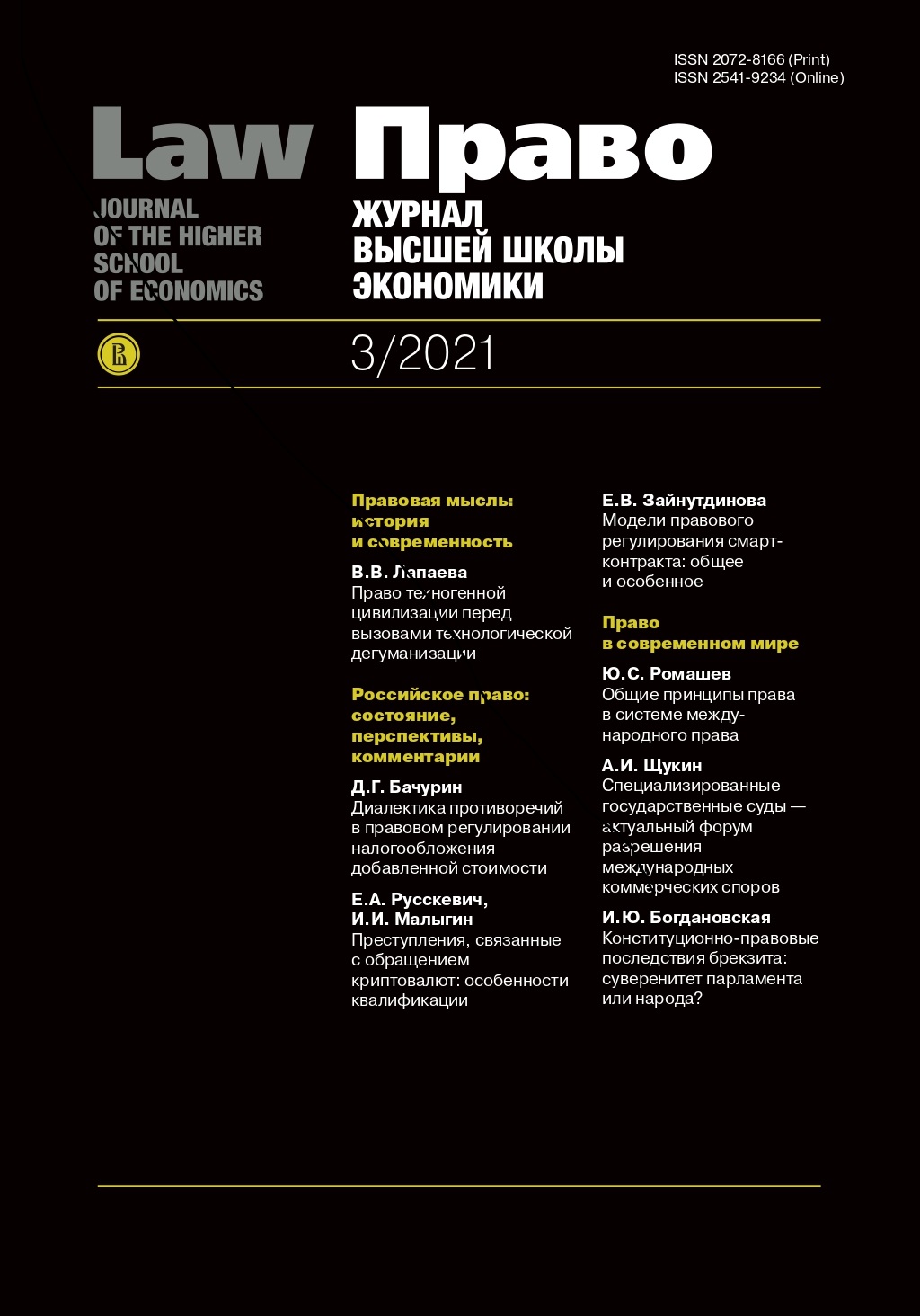Dialectics of Contradictions in Legal Regulation of Value Added Taxation
Abstract
The article examines a set of contradictions in the taxation of value added in the contemporary Russia, which can be found at the borders of the systems of public administration, fiscal distribution, social and economic reproduction. Among the social contradictions that cannot be overcome within the framework of existing legislation and which tend to increase in all groups in legal relations, allocated: economic-legal (manifested mainly in the sphere of production of material goods) between the nature of legal regulation of taxation of value added and the level of development of productive forces; between labor and capital as the main factors of production, affecting the performance of the mechanism of legal regulation of taxation of value added; financial and legal relations: between the actual nature of the modern Russian model of financial redistribution of added value and socially-oriented target settings for the use of funds received from value-added taxation; law enforcement: between the declarations of the fight against corruption and the situation when the majority of VAT tax fraud detected in the Russian Federation is based on schemes organized and executed with the participation of officials themselves within regulatory and law enforcement agencies; between the costs of effort and resources that are diverted to improving the legal regulation of VAT, and the persistent inability of the state institutions to eliminate the criminal networks of VAT fraud that form a new sector of criminal business; social and legal issues that are manifested in the process of structural deformations of civil society. The conclusion is made about the need to reform VAT in line with the conscious and systematic resolution of contradictions in the legal regulation of value-added taxation, expressed in the current Russian Federation legislative acts. The main conditions for overcoming the contradictions within the legal regulation of VAT have to become the following legislative restrictions: the state's legal policy have to be purposed at a fair financial and legal distribution of VAT revenues and the actual reduction of income inequality between the richest and poorest strata of the population; the largest part of tax payments is spent on the needs of the majority of citizens; the state's industrial policy must be aimed at the growth of capital-intensive modern production and labor productivity.
References
Amaral G., Olenike J., Amaral Viggiano L. (2008) Estudo sobre o verdadeiro custo da tributaçao brasileira. Instituto Brasileiro de Planejamento Tributàrio. Working Paper. Available at: http://www.banasqualidade.com.br/jornal_digital/custo%20brasil.pdf (дата обращения: 12.10.2020)
Crawford I., Keen M., Smith S. (2010) Value added tax and excises. Dimensions of tax design. Oxford: OUP, 1347 p.
Criminology (2015) V.N. Kudryavtsev, ed. Moscow: Norma, 800 p. (in Russian)
Ebrill L., Kin M., Boden J.-P., Summers V. (2003) Modern VAT. Moscow: Ves' mir, 274 p. (in Russian)
Eco U. (2016) From the tree to the maze. Historical studies of the sign and interpretation. Moscow: Akademicheskyi proyect, 559 p. (in Russian)
Eminov V.E. (2007) The concept of combating organized crime in Russia. Moscow: Prospekt, 48 p. (in Russian)
Ershov Yu.S. (2011) What awaits Russia, or Is it possible to believe long-term forecasts? ECO, no 12, pp. 36 (in Russian)
Kazakova M.V. (2010) Quality of VAT administration in the OECD countries and Russia. Reformation of the Russian tax collection system. Moscow: IEPP Press, 128 p. (in Russian)
Katasonov V. Yu. (2017) It's time to return home! The formation of capitalism in Russia as a history of economic failures. Memoirs of the Russian businessman Vasily Kokorev. Moscow: Rodnaya strana, 534 p. (in Russian)
Kee J. (2003) Fiscal decentralization: theory as reform. Working Paper Series George Washington University. 2003, pp. 1-34.
Kirillov V.F. (2008) Russian Constitutional law. Tyumen: University, 347 p. (in Russian)
Lukic M. (2017) Tributaçao no Brasil: estudos, ideias e propostas: ICMS: Entraves Jurídicos e Econômicos e Propostas de Melhoria. Rio de Janeiro: Instituto de Pesquisa Econômica Aplicada, 220 p.
Luneev V.V. (2007) Legal statistics. Moscow: Yurist, 394 p. (in Russian)
Malgan D. (2014) Locust and bee: predators and creators in the capitalism of the future. Moscow: Gaidar Institute, 371 p. (in Russian)
Priestland D. (2011) Red flag: a history of communism. Moscow: Eksmo, 973 p. (in Russian)
Rezende F. (2009) ICMS: Como era, o que mudou ao longo do tempo, perspectivas e novas mudanças. Cadernos Fórum Fiscal, no 10, pp. 1-50.
Rothbard M. (2016) Power and market: government and economy. Chelyabinsk: Sotsium, 416 p. (in Russian)
Schenk A., Thuronyi V., Cui W. (2015) Value added tax: a comparative approach. N.Y.: Cambridge University Press, 560 p.
Schwanebach P. H. (1903) Our tax-paying business. Saint Petersburg: Stasulevish, 403 p. (in Russian)
Sokolov A.A. (2003) Theory of taxes. Moscow: Centryurinform, 506 p. (in Russian)
Stiglitz D. (2017) The price of inequality. How social stratification threatens our society. Moscow: Eksmo, 255 p. (in Russian)
Tarasov I.T. (2004) Finance and taxes: essays on theory and politics. Moscow: Statut, 615 p. (in Russian)
Copyright (c) 2021 Law Journal of the Higher School of Economics

This work is licensed under a Creative Commons Attribution-ShareAlike 4.0 International License.


















